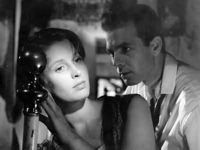tytuł oryginalny: Wspólny pokój / Roommates
reżyseria: Wojciech Jerzy Has
występują: Mieczysław Gajda, Gustaw Holoubek, Adam Pawlikowski
kraj i rok produkcji: Polska 1959
czas trwania: 92'
data premiery: 1960-02-08
original language: Polish with English subtitles

Międzywojenna Warszawa. Młody poeta, Lucjan Salis po powrocie z Zakopanego, gdzie leczył gruźlicę, wprowadza się do sublokatorskiego pokoju. Chce wierzyć, że wyzdrowieje i będzie pisał. Pozostali lokatorzy – literat Stukonis, student prawa Bednarczyk – oraz zaprzyjaźniony z nimi ekscentryczny „Dziadzia”, artysta życia, podobnie niespełnieni, funkcjonujący na marginesie rzeczywistości, także żyją iluzjami.
Adaptacja wydanej w 1932 roku i wówczas skandalizującej („pornograficzny paszkwil”) środowiskowej powieści Zbigniewa Uniłowskiego, który sportretował w niej członków literackiej grupy „Kwadryga”. Has odczytał ją po swojemu, ignorując ów towarzysko-personalny podtekst, łagodząc naturalistyczny ton i widząc w losach bohaterów historię bardziej uniwersalną, opowieść o młodych, niespełnionych artystach, wrażliwych outsiderach pogrążonych w marazmie i kultywujących swe wyobcowanie. Trzeci w dorobku reżysera film potwierdzający jego osobne miejsce w polskim kinie, zrealizowany z ulubionymi aktorami – z Gustawem Holoubkiem i Ireną Netto na czele – i pierwszy ze scenografem Jerzym Skarżyńskim, odtąd stałym współpracownikiem.
Lucjan (Mieczyslaw Gajda), after recuperation in Zakopane, comes to Warsaw. He hopes to start a literary career. A fellow poet and journalist Zygmunt (Adam Pawlikowski) offers him a place in a room in an old tenement. He would be sharing the room with Zygmunt’s brother Miecko (Ryszard Pietruski), a gipsy poet ‘Dziadzia’ (Gustaw Holoubek), a law student (Zdzislaw Maklakiewicz), a medicine student (Krzysztof Litwin) and his sister Teodozja (Beata Tyszkiewicz). The roommates lead an interesting social life in the tenement and at the cafe. Alcohol and jokes are their solution to poverty, pessimism and crowd in the room. Their relationships with women seem to be unsuccessful. Their male friendships can’t prevent tragic deaths, including Lucjan, who will suffer from tuberculosis again in difficult housing conditions. A group portrait of poets and students of the turn of the twenties of the 20th century, limited to the roommates of the room. However, it expresses the feelings of sadness, overwhelming nihilism and upcoming disasters. An adaptation of Zbigniew Unilkowski’s novel (1932) describing members of the literary group ‘Kwadryga’. In the prologue Gustaw Holoubek recites a poem by Konstanty Ildefons Galczynski called 'Sarg Street'. The poem includes the legendary Orphic thread set in Warsaw streets. The only film in Has’ filmography presenting humour of young people. It’s an example of poetic realism.